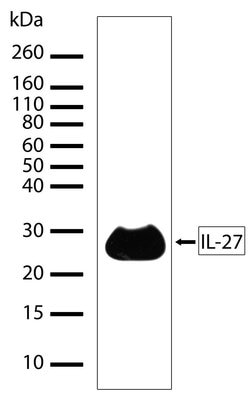Learn More
Invitrogen™ IL-27 p28 Recombinant Rabbit Monoclonal Antibody (7H7L10)
Rabbit Recombinant Monoclonal Antibody
Supplier: Invitrogen™ 701073
Description
Intact IgG appears on a non-reducing gel as ~150 kDa band and upon reduction generating a ~25 kDa light chain band and a ~50 kDa heavy chain. Recombinant rabbit monoclonal antibodies are produced using in vitro expression systems. The expression systems are developed by cloning in the specific antibody DNA sequences from immunoreactive rabbits. Then, individual clones are screened to select the best candidates for production. The advantages of using recombinant rabbit monoclonal antibodies include: better specificity and sensitivity, lot-to-lot consistency, animal origin-free formulations, and broader immunoreactivity to diverse targets due to larger rabbit immune repertoire.
IL-27, a member of the IL-12 family, is a heterodimeric protein consisting of the p40-related protein Epstein-Barr virus-induced gene 3 (EBI3) non-covalently linked to an IL-12p35-related protein, p28 (also known as IL-30). IL-27 is produced by activated APCs and mature dendritic cells. IL-27 exerts its activities on NK cells and naive CD4+ T cells; mRNA expression analysis of IL-27 receptor components (WSX-1/TCCR and gp130) suggests that IL-27 may also target other cells, including mast cells and monocytes. Binding of IL-27 to WSX-1/gp130 activates JAK1, STAT1, and STAT3 and STAT1/3 phosphorylation. WSX-1/TCCR-deficient mice develop impaired Th1 responses and are more susceptible to infection with L. monocytogenes suggesting that Th1 responses require IL-27. Although activation of WSX-1 is required for the initiation of Th1 responses, it is not necessary for maintaining Th1 responses. IL-27 alone is not able to induce the differentiation of CD4+ T cells into IFN-γ-producing cells, suggesting a role for IL-27 as an initial activator of Th1 responses. An important effect of IL-27 in initiating Th1 responses is the induction of the Th1-specific transcription factor T-bet as well as the suppression of the Th2-specific transcription factor GATA-3. T-bet plays a critical role in Th1 differentiation by its ability to maintain IL-12Rβ2 expression following CD4+ T cell activation. Recent studies indicate that IL-27 has a potent antitumor activity. In vitro, IL-27 has been found to act directly on naive CD8 cells, generating CTL with enhanced granzyme B expression. In vivo, IL-27 has been reported to augment CTL activity, inhibit tumor growth, and induce complete regression of primary and metastatic neuroblastoma tumors.
Specifications
| IL-27 p28 | |
| Recombinant Monoclonal | |
| 0.5 mg/mL | |
| PBS with 0.09% sodium azide | |
| Q8NEV9 | |
| Il27 | |
| Recombinant protein corresponding to amino acids 20-189 of human IL-27. | |
| 100 μg | |
| Primary | |
| Human | |
| Antibody | |
| IgG |
| Western Blot | |
| 7H7L10 | |
| Unconjugated | |
| Il27 | |
| IL27; IL-27; IL-27 p28 subunit; IL-27 subunit alpha; Il27a; IL-27A; IL-27-A; IL27-A; IL27p28; IL-27p28; IL30; IL-30; ILN; Interleukin; interleukin 27; interleukin 30; Interleukin-27; interleukin-27 subunit alpha; Interleukin-30; p28 | |
| Rabbit | |
| Protein A | |
| RUO | |
| 246778 | |
| Store at 4°C short term. For long term storage, store at -20°C, avoiding freeze/thaw cycles. | |
| Liquid |
Safety and Handling
Your input is important to us. Please complete this form to provide feedback related to the content on this product.
